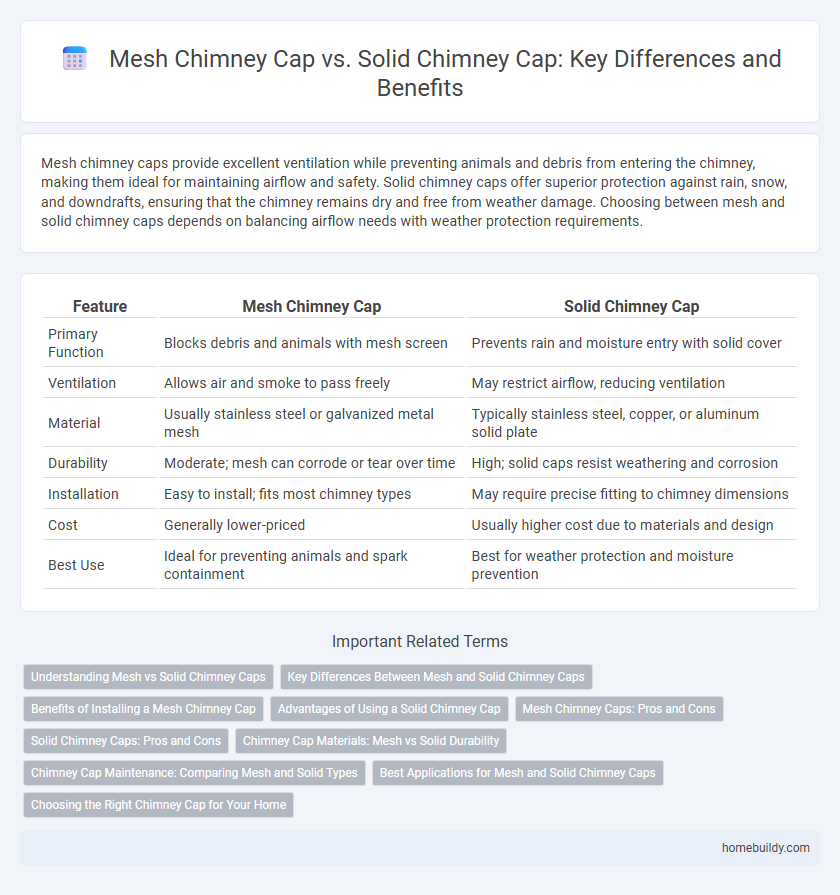Mesh chimney caps provide excellent ventilation while preventing animals and debris from entering the chimney, making them ideal for maintaining airflow and safety. Solid chimney caps offer superior protection against rain, snow, and downdrafts, ensuring that the chimney remains dry and free from weather damage. Choosing between mesh and solid chimney caps depends on balancing airflow needs with weather protection requirements.
Table of Comparison
| Feature | Mesh Chimney Cap | Solid Chimney Cap |
|---|---|---|
| Primary Function | Blocks debris and animals with mesh screen | Prevents rain and moisture entry with solid cover |
| Ventilation | Allows air and smoke to pass freely | May restrict airflow, reducing ventilation |
| Material | Usually stainless steel or galvanized metal mesh | Typically stainless steel, copper, or aluminum solid plate |
| Durability | Moderate; mesh can corrode or tear over time | High; solid caps resist weathering and corrosion |
| Installation | Easy to install; fits most chimney types | May require precise fitting to chimney dimensions |
| Cost | Generally lower-priced | Usually higher cost due to materials and design |
| Best Use | Ideal for preventing animals and spark containment | Best for weather protection and moisture prevention |
Understanding Mesh vs Solid Chimney Caps
Mesh chimney caps provide ventilation while preventing debris, animals, and sparks from entering the flue, making them ideal for wood-burning fireplaces. Solid chimney caps, often made of metal, offer complete coverage and are best suited for chimney systems requiring full protection against rain and downdrafts. Selecting the appropriate type depends on factors such as chimney design, exposure to weather elements, and desired airflow control.
Key Differences Between Mesh and Solid Chimney Caps
Mesh chimney caps feature a screen that prevents debris, animals, and sparks from entering the chimney while allowing ventilation and smoke to escape, making them ideal for wood-burning fireplaces. Solid chimney caps provide a sturdy cover that blocks rain, snow, and drafts completely but require a venting system to ensure proper airflow. The key differences lie in their material design and primary function: mesh caps prioritize airflow and protection, whereas solid caps emphasize weatherproofing and draft prevention.
Benefits of Installing a Mesh Chimney Cap
A mesh chimney cap prevents animals, leaves, and debris from entering the chimney while allowing proper airflow, reducing the risk of blockages and fire hazards. It also helps to keep rain out, protecting the chimney structure from water damage and rust. Compared to a solid chimney cap, the mesh variant enhances ventilation and improves overall chimney safety and longevity.
Advantages of Using a Solid Chimney Cap
Solid chimney caps provide superior protection against rain, snow, and debris, preventing water damage and blockages in the flue. Their robust design enhances safety by effectively blocking animals and birds from entering the chimney, reducing fire hazards. Maintenance demands are lower for solid caps due to their durable construction, ensuring long-term reliability and functionality.
Mesh Chimney Caps: Pros and Cons
Mesh chimney caps provide effective ventilation while preventing debris, animals, and embers from entering the chimney, reducing fire hazards. Their durable stainless steel construction resists rust and corrosion, ensuring long-term protection with minimal maintenance. However, mesh caps can become clogged with creosote over time, requiring regular cleaning to maintain optimal airflow and safety.
Solid Chimney Caps: Pros and Cons
Solid chimney caps provide superior protection against rain, snow, and animals entering the chimney, reducing potential damage and blockages. However, their design can restrict airflow compared to mesh caps, which may affect chimney draft and increase the risk of smoke backup. Maintenance of solid caps may require more frequent inspections to ensure the cap remains clear of debris and functioning properly.
Chimney Cap Materials: Mesh vs Solid Durability
Mesh chimney caps, commonly made from stainless steel or galvanized steel, offer excellent durability by resisting rust and corrosion while preventing debris and animals from entering the chimney. Solid chimney caps, often constructed from heavier gauge metals like copper or aluminum, provide superior rigidity and long-lasting protection against harsh weather conditions and structural damage. Both materials ensure chimney longevity, but solid caps typically require less maintenance due to their robust, solid design.
Chimney Cap Maintenance: Comparing Mesh and Solid Types
Mesh chimney caps require regular cleaning to prevent debris buildup and ensure proper ventilation, while solid chimney caps demand less frequent maintenance but may need inspection for rust or damage. Both types protect the chimney from rain, animals, and sparks, but mesh caps offer better airflow with the tradeoff of potential clogging. Choosing between mesh and solid chimney caps depends largely on balancing maintenance efforts with ventilation needs and environmental exposure.
Best Applications for Mesh and Solid Chimney Caps
Mesh chimney caps are ideal for properties located in wooded or windy areas where protection against debris, animals, and embers is crucial, as their screen design prevents blockages and enhances airflow. Solid chimney caps are best suited for environments with heavy rain or snow exposure, providing superior waterproofing and preventing moisture damage to the chimney structure. Choosing the appropriate chimney cap type based on local weather and environmental conditions ensures optimal chimney performance and longevity.
Choosing the Right Chimney Cap for Your Home
Choosing the right chimney cap involves evaluating mesh and solid options based on your home's specific needs, such as ventilation and protection from debris. Mesh chimney caps provide superior airflow while preventing animals and sparks from entering the chimney, making them ideal for homes in wooded or rural areas. Solid chimney caps offer robust protection against rain and downdrafts, suitable for environments with heavy precipitation or strong winds.
Mesh chimney cap vs Solid chimney cap Infographic

 homebuildy.com
homebuildy.com